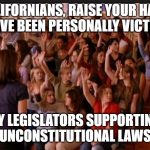
Addiction Lawsuit Against Character AI Can Proceed–Garcia v. Character Technologies
Online addiction lawsuits are proliferating across the country, a trend that will continue so long as plaintiffs think they can win. This decision largely rejects the defendants’ motion to dismiss, which will induce more plaintiff lawyers to bring more cases….
Meta Pixels Case Dismissed by Second Circuit–Solomon v. Triller
This ruling combines three common blog topics: (1) the VPPA 🙄, which always gets an eyeroll emoji because so many VPPA cases are obviously meritless, (2) the Meta Pixel cases, which are the modern successors to the 2003 Pharmatrak case…

Leaky TOS Formation = No TOS Formation–Snyder v. G6
This is a Meta pixels case agains the G6 hotel chain (a/k/a Motel 6). G6 sought to arbitrate the case per its TOS. G6 presented the court with a screenshot of Motel 6’s standard account creation process: G6 added the…

Ninth Circuit Takes a Wrecking Ball to Internet Personal Jurisdiction Law–Briskin v. Shopify
Let’s start with a tiny piece of good news. The majority says: “The parties agree among themselves that we need not develop an internet-specific standard for personal jurisdiction. We also agree.” No need for Internet exceptionalist rules. Yay! With that…

Why I Emphatically Oppose Online Age Verification Mandates
I’ve posted a new paper, “The “Segregate-and-Suppress” Approach to Regulating Child Safety Online.” If that phrase sounds familiar, it’s because I’ve been referencing this paper on the blog for months. The paper details my extensive and multi-dimensional criticisms of mandatory…

Courts’ Expectations for TOS Formation Keep Going Up—Lee v. Plex
This is a VPPA claim against Plex (a video streaming service) regarding the use of Meta Pixels. 🙄🙄 The defendant invoked the arbitration clause in its TOS. Extensively citing Chabolla, the court rejects the arbitration request. Here is Plex’s sign-up…

Are You Ready for MAGA to Weaponize Anti-Doxxing Statutes?–Watts v. Daily Kos
Wikipedia describes Anthony Watts as “a climate change denial blogger” who “opposes the scientific consensus on climate change.” The Daily Kos published an article about Watts, “Heartland Fundraising For Tony Watts’ $2,000 Thermometers To Compete With Global Temp Network,” that…

California’s Age-Appropriate Design Code (AADC) Is Completely Unconstitutional (Multiple Ways)–NetChoice v. Bonta
I don’t normally start my blog posts with a meme, but this one tells you everything you need to know: * * * This blog post concerns the California Age-Appropriate Design Code (AADC), passed by the California legislature in 2022….

Fourth Circuit Upholds TOS Formation Despite a Bad Call-to-Action, But Strikes Down Unilateral Amendment Clauses
Two noteworthy rulings this week from the Fourth Circuit regarding TOS formation issues. Dhruva v. CuriosityStream, Inc., No. 24-1080 (4th Cir. March 10, 2025) Curiosity Stream is a paywalled site for documentary videos. The plaintiffs brought a Meta pixels case…

Verizon and Its Cloud Vendor Must Face Lawsuit for Reporting “CSAM” That Wasn’t – Lawshe v. Verizon (Guest Blog Post)
by guest blogger Riana Pfefferkorn Child sex abuse material, or CSAM, is a longstanding scourge on the Internet. Like the baseball diamond in “Field of Dreams,” if you build a service that allows file transmission or storage, someone will come…
